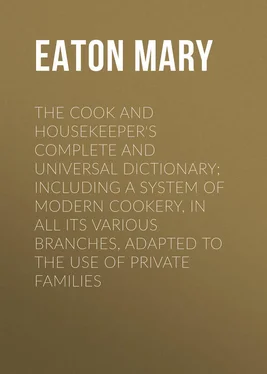CUSTARD PASTE. Six ounces of butter, three spoonfuls of cream, the yolks of two eggs, and half a pound of flour, are to be mixed well together. Let it stand a quarter of an hour, work it well, and roll it out thin.
CUSTARD PUDDING. Mix by degrees a pint of good milk with a large spoonful of flour, the yolks of five eggs, some orange-flower water, and a little pounded cinnamon. Butter a bason that will just hold it, pour in the batter, and tie a floured cloth over. Put it in when the water boils, turn it about a few minutes to prevent the egg settling on one side, and half an hour will boil it. Put currant jelly over the pudding, and serve it with sweet sauce.
CUTLETS MAINTENON. Cut slices of veal three quarters of an inch thick, beat them with a rolling-pin, and wet them on both sides with egg. Dip them into a seasoning of bread crumbs, parsley, thyme, knotted marjoram, pepper, salt, and a little grated nutmeg. Then put them into white papers folded over, and broil them. Have ready some melted butter in a boat, with a little mushroom ketchup. – Another way is to fry the cutlets, after they have been prepared as above. Dredge a little flour into the pan, and add a piece of butter; brown it, pour in a little boiling water, and boil it quick. Season with pepper, salt, and ketchup, and pour over them. – Or, prepare as before, and dress the cutlets in a Dutch oven. Pour over them melted butter and mushrooms. Neck steaks especially are good broiled, after being seasoned with pepper and salt; and in this way they do not require any herbs.
CUTTING GLASS. If glass be held in one hand under water, and a pair of scissors in the other, it may be cut like brown paper; or if a red hot tobacco pipe be brought in contact with the edge of the glass, and afterwards traced on any part of it, the crack will follow the edge of the pipe.
CUTTING OF TEETH. Great care is required in feeding young children during the time of teething. They often cry as if disgusted with food, when it is chiefly owing to the pain occasioned by the edge of a silver or metal spoon pressing on their tender gums. The spoon ought to be of ivory, bone, or wood, with the edges round and smooth, and care should be taken to keep it sweet and clean. At this period a moderate looseness, and a copious flow of saliva, are favourable symptoms. With a view to promote the latter, the child should be suffered to gnaw such substances as tend to mollify the gums, and by their pressure to facilitate the appearance of the teeth. A piece of liquorice or marshmallow root will be serviceable, or the gums may be softened and relaxed by rubbing them with honey or sweet oil.
Dairy. In a publication intended for general usefulness, the management of the dairy, the source of so many comforts, demands some attention, in addition to the information conveyed under various other articles, connected with this interesting part of female economy. A dairy house then ought to be so situated that the windows or lattices may front the north, and it should at all times be kept perfectly cool and clean. Lattices are preferable to glazed lights, as they admit a free circulation of air; and if too much wind draws in, oiled paper may be pasted over the lattice, or a frame constructed so as to slide backwards and forwards at pleasure. Dairies cannot be kept too cool in the summer: they ought therefore to be erected, if possible, near a spring of running water. If a pump can be fixed in the place, or a stream of water conveyed through it, it will tend to preserve a continual freshness and purity of the air. The floor should be neatly paved with red brick, or smooth stone, and laid with a proper descent, so that no water may stagnate: it should be well washed every day, and all the utensils kept with the strictest regard to cleanliness. Neither the cheese, rennet, or cheesepress, must be suffered to contract any taint; nor should the churns be scalded in the dairy, as the steam arising from the hot water tends greatly to injure the milk. The utensils of the dairy should all be made of wood: lead, copper, and brass are poisonous, and cast iron gives a disagreeable taste to the productions of the dairy. Milk leads in particular should be utterly abolished, and well-glazed earthen pans used in their stead. Sour milk has a corroding tendency, and the well known effects of the poison of lead are, bodily debility, palsy, and death. The best of all milk vessels are flat wooden trays about three inches deep, and wide enough to contain a full gallon of milk. These may be kept perfectly clean with good care, and washing and scalding them well with salt and water. As soon as the operation of churning is performed, the butter should be washed immediately in several waters, till thoroughly cleansed from the milk, which should be forced out with a flat wooden ladle, or skimming dish, provided with a short handle. This should be quickly performed, with as little working of the butter as possible; for if it be too much beaten and turned, it will become tough and gluey, which greatly debases its quality. To beat it up with the hand is an indelicate practice, as the butter cannot fail to imbibe the animal effluvia: a warm hand especially will soften it, and make it appear greasy. If the heat of the weather should render it too soft to receive the impression of the mould, it may be put into small vessels, and allowed to swim in a trough of cold water, provided the butter do not come in contact with the water, which would diminish some of its best qualities. A little common salt must be worked up in the butter at the time of making it, and care must be taken not to handle it too much. Meat hung in a dairy will taint the air, and spoil the milk. – See Butter, Cheese, Churning, &c.
DAMP BEDS. Of all other means of taking cold, damp beds are the most dangerous, and persons who keep them in their houses are guilty of a species of murder, though it unfortunately happens that no housewife is willing to acknowledge that her beds were ever damp. There is however no other effectual way of preventing the dreadful effects so often experienced in this way, than by keeping the beds in constant use, or causing them frequently to be slept in till they are wanted by a stranger. In inns, where the beds are used almost every night, nothing more is necessary than to keep the rooms well aired, and the linen quite dry. If a bed be suspected of dampness, introduce a glass goblet between the sheets with its bottom upwards, immediately after the warming pan is taken out. After a few minutes, if any moisture adheres to the inside of the glass, it is a certain sign that the bed is damp: but if only a slight steam appears, all is safe. If a goblet be not at hand, a looking glass will answer the purpose. The safest way in all such cases is to take off the sheets, and sleep between the blankets.
DAMP HOUSES. Nothing is more common than for persons to hazard their lives by inhabiting a dwelling almost as soon as the plasterer or the painter has performed his work, and yet this ought to be guarded against with the utmost care. The custom of sitting in a room lately washed, and before it is thoroughly dried, is also highly injurious to health. Colds occasioned by these means often bring on asthmas and incurable consumptions.
DAMP WALLS. When a house has undergone repairs, the walls are apt to become damp, as well as when it has been new built. To prevent the ill effects, powder some glass fine, mix it with slacked lime, dry the mixture well in an iron pot, and pass it through a flour sieve. Then boil some tar with a little grease for a quarter of an hour, and make a cement of the whole together. Care must be taken to prevent any moisture from mixing with the cement, which must be used as soon as made. Lay it on the damp part of the wall like common plaster about a foot square at a time, or it will quickly become too hard for use: if the wall be very wet, a second coating will be required. Common hair mortar may then be laid on, with the addition of a little Paris plaster, which will prevent the walls in future from becoming damp.
Читать дальше












![John Bruce - The Lettsomian Lectures on Diseases and Disorders of the Heart and Arteries in Middle and Advanced Life [1900-1901]](/books/749387/john-bruce-the-lettsomian-lectures-on-diseases-and-disorders-of-the-heart-and-arteries-in-middle-and-advanced-life-1900-1901-thumb.webp)